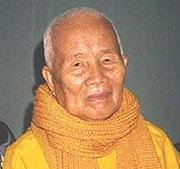The Life and Times of Thich Huyen Quang
By VO VAN AI, THE WALL STREET JOURNAL ASIA, July 14, 2008
Hanoi, Vietnam -- Thich Huyen Quang, 87, patriarch of the Unified Buddhist Church of Vietnam, died in Vietnam on July 5 at the Nguyen Thieu Monastery in Binh Dinh.
 << Thich Huyen Quang 1921 - 2008
<< Thich Huyen Quang 1921 - 2008
One of Vietnam's most beloved and esteemed spiritual leaders, Quang was also a proponent of religious freedom and human rights in a country where both are in short supply. His life and death illustrate the moral bankruptcy of Vietnam's Communist regime.
Quang spent more than half his life in prison, internal exile or under house arrest under a succession of political regimes for preaching opposition to tyranny in all its forms. Along with the UBCV deputy leader Thich Quang Do, he was sent into internal exile in 1982 and detained in remote provinces for the past 26 years for refusing to submit Vietnamese Buddhism to Communist Party control.
After subjecting Quang to detention and isolation throughout his life, Hanoi's rulers sought to draw political capital from his death by insisting that his funeral be organized by the state-sponsored Vietnam Buddhist Church. Meanwhile the government-controlled media ran a vitriolic campaign to discredit Quang's natural successor, Mr. Do.
They accused him and "other extremist elements disguised as Buddhist monks" of "plotting dark schemes" and "immoral actions" by trying to turn the funeral into an "anti-government rally." Mr. Do firmly denounced all government interference, and ultimately led the funeral on Friday, July 11, under the auspices of the banned UBCV.
As a member of the World Trade Organization and this month's rotating president of the United Nations Security Council, Vietnam seeks to play an increasing role on the global stage. The reality of the official media's harsh rhetoric contrasts starkly with the pragmatic pronouncements of Vietnam's leadership, who extol the merits of capitalism and free-market reforms. Thirty years after the end of the Vietnam War, there are still no opposition parties, no free press, no free trade unions and no civil society. All independent religions are banned, and advocacy of human rights or democracy remains taboo.
In this political vacuum, the religious movements in Vietnam -- especially Buddhism, with its tradition of social activism and adhered to by two-thirds of the Vietnam's 84 million people -- have assumed a key role in voicing the people's grievances and pressing for individual freedoms and rights. They are the true voices of civil society in Vietnam today. Indeed, this is the real crux of the conflict between the government and the UBCV, which it has banned. Quang demanded, and Mr. Do demands, not only religious freedom but the respect of basic human rights and democratic freedoms for all Vietnamese.
At least 10,000 UBCV monks, nuns and lay followers braved government intimidation and possible arrest to attend his funeral in Binh Dinh and honor their beloved leader. Paying his last respects before Quang's coffin at the funeral at Nguyen Thieu Monastery Friday, Mr. Do made the following solemn pledge:
"You have left us for ever, but the struggle for UBCV legality and human rights goes on. We pledge to continue your peaceful combat, to follow the path you traced. We know that countless obstacles lie ahead, and we are ready to confront them. We will not cease until we have fulfilled your dream to see the UBCV regain its legal status and win back the freedoms stolen from us by the Communist regime in 1975."
Mr. Ai is the international spokesman of the Unified Buddhist Church of Vietnam.

 << Thich Huyen Quang 1921 - 2008
<< Thich Huyen Quang 1921 - 2008